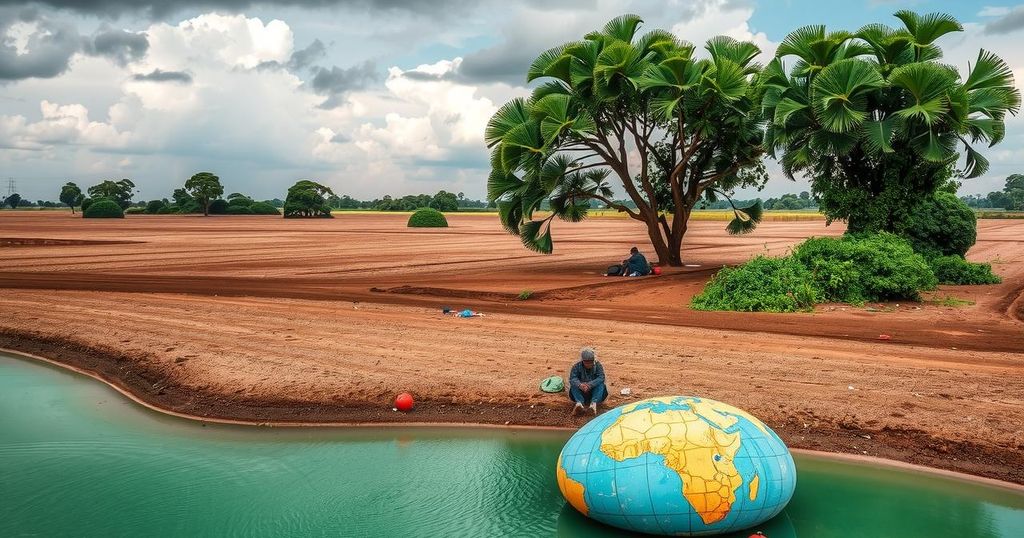Cyclone Chido Highlights Increasing Climate Challenges for Mozambique and Malawi

Cyclone Chido has devastated northern Mozambique, displacing thousands and highlighting increased climate challenges in Mozambique and Malawi. The cyclone, with winds up to 260 km/h, affected education, healthcare, and infrastructure. Local authorities are improving preparedness for such events, but the situation remains dire with long-term implications for affected communities as they navigate the aftermath of repeated cyclones and climate change impacts.
Recent developments in southern Africa reveal the increasing climate challenges confronting Mozambique and Malawi, particularly following Cyclone Chido, which struck on December 15, 2024. This cyclone has caused widespread devastation, especially in the Cabo Delgado and Nampula provinces of Mozambique, displacing thousands of individuals and exacerbating the already existing vulnerabilities in the region. This cyclone’s devastation emerges against a backdrop of frequent extreme weather events, highlighting the urgent need for action against climate change and its associated consequences.
Cyclone Chido brought torrential rains and winds reaching 260 km/h (160 mph), leading to significant destruction, including the loss of lives and critical infrastructure. The extent of the impact remains unclear as communication has been disrupted in various districts. Humanitarian organizations are responding promptly, yet the scale of the disaster’s effects, notably on education and healthcare facilities, poses serious concerns for the well-being of the communities. UNICEF’s representatives have pointed out the immediate and long-term implications of such weather events on children’s education and public health.
In recent years, Mozambique and Malawi have been no strangers to severe storms, experiencing cyclones almost yearly. Lucy Mtilatila, Director of Climate Change and Meteorological Services in Malawi, noted the increasing frequency of such natural disasters, emphasizing that it was once unusual to endure tropical cyclones often. It is critical for regional governments to adapt and prepare effectively for future cyclones as climate change intensifies their frequency and severity, necessitating improved infrastructure and community resilience.
In contrast to past responses, preparations for Cyclone Chido see improved coordination among various sectors in Malawi. Emergency measures, including the establishment of shelters and the stockpiling of food supplies, demonstrate progress in disaster readiness. However, significant challenges remain due to the compounded impact of recent climatic events, like drought and poor agricultural yields. The need for international assistance and a focus on sustainable solutions is paramount as the region strives for recovery and resilience against future climatic adversities.
Given the continued threats posed by climate change, experts advocate for increased global support to strengthen resilience and combat the underlying causes of global warming. As steps are taken to rebuild and recover, there is hope for a more resilient approach that ensures communities are adequately equipped for future challenges.
The increasing incidence of climate-related disasters in southern Africa, particularly Mozambique and Malawi, is partly attributed to climate change and rising global temperatures. Both nations are grappling with the adverse effects of extreme weather events, where cyclones have become more frequent and severe in recent years. The consecutive hit from cyclones has not only displaced thousands of people but also strained local infrastructure, agricultural output, and public health systems, making immediate and long-term mitigation and recovery efforts critical for affected communities. Localized efforts by organizations and government bodies aim to enhance resilience through improved disaster preparedness, infrastructural investments, and community support while addressing the growing threats posed by climate change in the region.
In conclusion, the recent destruction caused by Cyclone Chido emphasizes the urgent need for enhanced climate resilience strategies in Mozambique and Malawi. With climate change worsening weather patterns, regional authorities and humanitarian organizations must prioritize preparedness and response mechanisms while addressing the long-term challenges posed by repeated cyclones. Continued international cooperation and support are crucial for rebuilding efforts and ensuring vulnerable communities can withstand future disasters.
Original Source: www.dw.com








